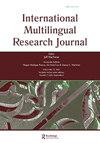IF 2.1
1区 文学
Q2 EDUCATION & EDUCATIONAL RESEARCH
International Multilingual Research Journal
Pub Date : 2021-12-24
DOI:10.26499/multilingual.v20i2.253
引用次数: 0
摘要
本研究旨在a)描述基于S. Keyzer的班加尔谚语的分类;b)描述谚语在班加尔社会中的作用。本研究是描述性质的。数据采集采用SBLC技术和记录技术。资料以孟加拉语谚语或表达的形式收录在由Syamsiar Semar编写的《Paribasa Urang》一书中。数据是根据S. Keyzer分组进行分类处理的。结果表明,根据S. Keyzer的分类,班加尔语谚语可分为:a)动物谚语;B)一组植物谚语;C)人类谚语组;D)亲属谚语组;E)身体功能谚语组;2)班贾尔谚语的功能包括:1)主人想象力的镜子或投射;2)认可文化机构制度的工具;3)教育工具;4)压制或强制执行社区价值观(社会压力手段)和控制行为的手段。社区(实行社会控制)。关键词:谚语,教育,价值观本文章由计算机程序翻译,如有差异,请以英文原文为准。
KLASIFIKASI DAN FUNGSI PERIBAHASA DALAM MASYARAKAT BANJAR The Classification and Functional of Banjarese’s Proverb.
This study aims to a) describe the classification of Banjar proverbs based on S. Keyzer; and b) describe the function of proverbs in Banjar society. This research is descriptive qualitative. Data collection using SBLC technique and recording technique. The data are in the form of Banjarese proverbs or expressions contained in the book Paribasa Urang by Syamsiar Semar. The data is processed by being classified based on the S. Keyzer grouping. The results showed that based on S. Keyzer's classification, Banjar proverbs were classified as: a) animal proverbs; b) group of plant proverbs; c) group of human proverbs; d) group of kinship proverbs; e) group of body function proverbs; 2) The functions of Banjar proverbs include 1) a mirror or projection of the owner's imagination, 2) a tool for ratifying the institutions of cultural institutions, 3) an educational tool, and 4) a means of suppressing or forcing the implementation of community values (means of social pressure), and controlling behavior. community (exercion social control).Key words: proverbs, education, values
求助全文
通过发布文献求助,成功后即可免费获取论文全文。
去求助
来源期刊
CiteScore
4.10
自引率
4.80%
发文量
19
期刊介绍:
The International Multilingual Research Journal (IMRJ) invites scholarly contributions with strong interdisciplinary perspectives to understand and promote bi/multilingualism, bi/multi-literacy, and linguistic democracy. The journal’s focus is on these topics as related to languages other than English as well as dialectal variations of English. It has three thematic emphases: the intersection of language and culture, the dialectics of the local and global, and comparative models within and across contexts. IMRJ is committed to promoting equity, access, and social justice in education, and to offering accessible research and policy analyses to better inform scholars, educators, students, and policy makers. IMRJ is particularly interested in scholarship grounded in interdisciplinary frameworks that offer insights from linguistics, applied linguistics, education, globalization and immigration studies, cultural psychology, linguistic and psychological anthropology, sociolinguistics, literacy studies, post-colonial studies, critical race theory, and critical theory and pedagogy. It seeks theoretical and empirical scholarship with implications for research, policy, and practice. Submissions of research articles based on quantitative, qualitative, and mixed methods are encouraged. The journal includes book reviews and two occasional sections: Perspectives and Research Notes. Perspectives allows for informed debate and exchanges on current issues and hot topics related to bi/multilingualism, bi/multi-literacy, and linguistic democracy from research, practice, and policy perspectives. Research Notes are shorter submissions that provide updates on major research projects and trends in the field.

 求助内容:
求助内容: 应助结果提醒方式:
应助结果提醒方式:


